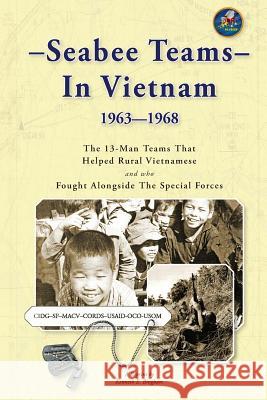Seabee Teams In Vietnam 1963-1968: 13 Man Teams That Helped Rural Vietnamese and who Fought Alongside The Special Forces » książka
Seabee Teams In Vietnam 1963-1968: 13 Man Teams That Helped Rural Vietnamese and who Fought Alongside The Special Forces
ISBN-13: 9781461192107 / Angielski / Miękka / 2012 / 234 str.
Seabee Teams In Vietnam 1963-1968: 13 Man Teams That Helped Rural Vietnamese and who Fought Alongside The Special Forces
ISBN-13: 9781461192107 / Angielski / Miękka / 2012 / 234 str.
(netto: 56,67 VAT: 5%)
Najniższa cena z 30 dni: 59,83
ok. 16-18 dni roboczych
Bez gwarancji dostawy przed świętami
Darmowa dostawa!
American Baby Boomers--of the 1960's--are often portrayed in the media as either in the mud of Woodstock or in the mud of Vietnam. The truth is, just a small percentage--3% total--were in either place. Most Baby Boomers were living normal lives doing normal things. But for those who took an active part in the Cold War--which we won--and which included Vietnam--this book is dedicated to you. Book includes the records of the 13-man STAT TEAMS (later known as Seabee Teams) that served in Vietnam. The Navy Seabees were some of the first to show up for Vietnam's struggle against communism. In 1954, President Ngo Dinh Diem wrote a letter to President Eisenhower asking for military and economic aid. In 1954 and 1955 an estimated one million refugees (mostly persecuted Catholics) moved from the Communist State of North Vietnam to the south (8% of the North's population). The Seabees assisted them during their "Passage to Freedom." In 1956, Seabees were assigned to survey Vietnam's roads. There weren't many. The Seabees travelled by jeep and on foot with pack-mules. The surveyors found that the bombers of World War II, the guerrillas of Viet Minh, and the newly emerging guerrilla groups of the Viet Cong had destroyed most of the bridges and sabotaged what few roads were left. Beginning in 1963, Seabee Teams, with Secret Clearances, arrived in Vietnam to assist the U.S. Army's Special Forces in the CIA funded Civilian Irregular Defense Group (CIDG) program, and to help the Vietnamese help themselves. The Seabees constructed Special Forces Camps and outposts, airfields for the SF STOL-class Caribou aircraft, and built connecting roads. These Seabee Teams also helped the Vietnamese to better their living conditions through thousands of projects in rural areas. The Seabee Teams in Vietnam also earned Purple Hearts, Silver Stars, Bronze Stars and many other medals. One Seabee Team member, Marvin Sheilds, earned the Congressional Medal Of Honor while fighting alongside with the Special Forces at Dong Xoi. In 1963, only approximately 10,000 Americans were in Vietnam and very little infrastructure existed. This was before the eventual arrival of 2.1 million--over time--Americans. Given the limited infrastructure--with hardly any ports, roads and airstrips--it would have been near impossible to get the 2.1 million eventual Americans--along with their equipment (Beans, Bullets, And Black Oil)--delivered to South Vietnam and support them. Many Vietnam Vets--including this writer--showed up after 1965. Most of us took it for granted that the air bases we landed in, roads we drove on, helo-pads we mounted out from and the camps we lived in, or passed through, and the water and food and fuel storage were somehow always there--or most likely didn't give it a thought. But long before we arrived, military and civilian engineers were busy preparing the "ground" to make it possible to fight a war; and begin attempts to win the hearts and minds of the South Vietnamese. A recent travel guide to Vietnam mentioned the superior roads and infrastructure in the Southern portion of Vietnam--as opposed to North Vietnam-- due to the American presence there during the Vietnam War. --Kenneth E. Bingham, Seabee volunteer, Feb, 2013
Zawartość książki może nie spełniać oczekiwań – reklamacje nie obejmują treści, która mogła nie być redakcyjnie ani merytorycznie opracowana.











